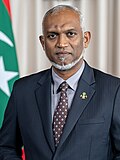
The President of the Maldives is the head of state and head of government of the Republic of Maldives. The President is directly elected by the citizens of the country through a popular vote for a five-year term. [1] The President serves as the commander-in-chief of the Maldives National Defence Force and leads the cabinet of the Maldives. [2] [3] The powers of the President are derived from the latest constitution implemented in 2008. [4]
Contents
During the early republic, executive authority in the Maldives was split between the President and the Prime Minister of the Maldives. The President served as the head of state while the Prime Minister served as the head of government. [5] A constitutional amendment in the 1942 constitution transferred executive power of the country to the Ministry of Home Affairs, effectively making the Minister of Home Affairs the head of government. [5] In 1951, the constitution was amended to revert the earlier amendment which now made the Prime Minister the head of government. [5] The role of Prime Minister during the republic was held by Ahmed Zaki from 1972 until its abolition in 1975 by President Ibrahim Nasir. [6] The position was abolished because of abuses of the office. [7]
The nation was previously a sultanate run by Sultans before a constitutional referendum was held in 1952 to change the governance to a democracy. [8] The First Republic of the Maldives was declared on 1 January 1953; the republic was abolished eight months later on 21 August 1953, when President Mohamed Amin Didi was beaten to death. [9] After he died of his injuries, he was succeeded by then-Vice President of the Maldives, Ibrahim Muhammad Didi, as acting President. [9] The monarchy was restored in another constitutional referendum the same year. [10] Another constitutional referendum was held in 1968 to return to a presidential republic was supported and implemented. [11] Since the declaration of the second republic in 1968, there have been seven Presidents as of October 2025. [12]
A short-lived breakaway state called the United Suvadive Republic (1959–1963) was declared by the southern atolls of the Maldives (Addu, Fuvahmulah, and Huvadhu) due to discontent with the central government in Malé. [13] [14] Its first and last President was Abdullah Afeef who served until its creation to its abolition. [13]
Since 1968, two Presidents (Ibrahim Nasir and Mohamed Nasheed) have resigned from the post. [15] [16] Mohamed Amin Didi was the shortest-serving President, serving for a total of 7 months and 21 days in 1953. Maumoon Abdul Gayoom served as President for 30 years, from 1978 to 2008, making him the longest-serving President and one of the longest-serving Presidents in Asia. [17] The incumbent President is Mohamed Muizzu, who assumed office on 17 November 2023. [18]









